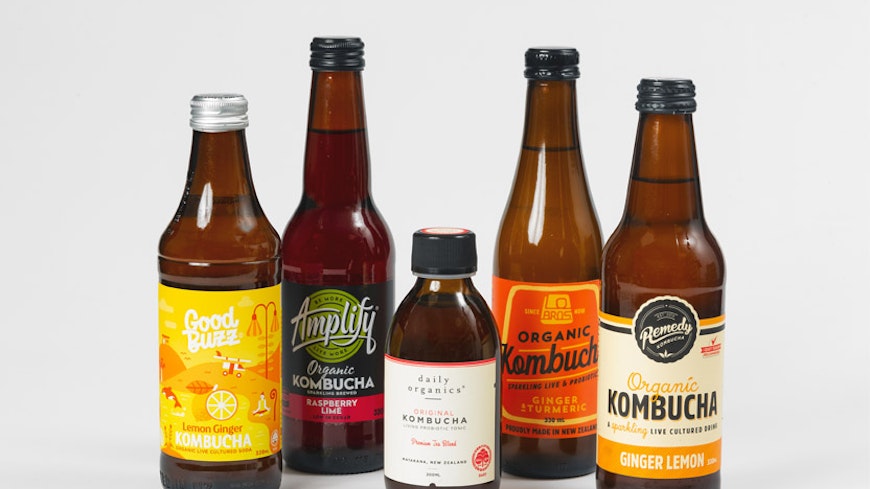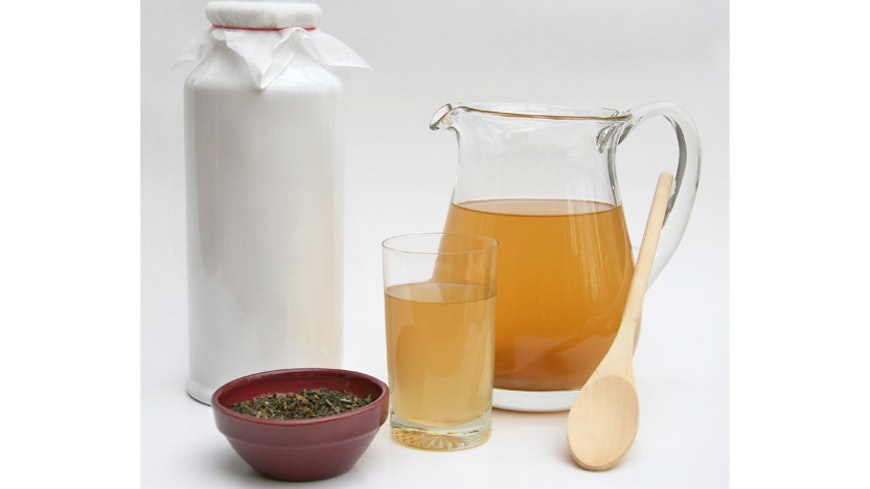
By Olivia Wannan
Former Investigative Writer | Kaituhi Mātoro
Feeling parched, yet want a healthier choice? You might reach for a bottle of kombucha. The fermented tea has been growing in popularity as science uncovers the role probiotics, found in pills to pickles, can have on human health.
Although very little research has looked at kombucha, manufacturers haven’t held back. Daily Organics described its drink as a “living health tonic”. Good Buzz marketed its “live cultured soda” as containing “millions of gut lovin’ probiotics”.
What you might hear less about is the residual alcohol that all kombucha – often considered a healthy beverage choice – contains.
In the kombucha brewing process, a microbial culture of bacteria and yeast is added to sugar and black or green tea. This combo is left to ferment, during which alcohol, vinegar and other compounds are created. Our tests found one brand with a higher alcohol content than some low-strength beers.
What we did
We selected five brands of kombucha sold at supermarkets and sent two batches of each to an independent laboratory to check their alcohol content. There’s no standard for testing kombucha, so we used an alcohol test performed under International Accreditation New Zealand accreditation, and used by the Ministry for Primary Industries (MPI) when it investigated reports of high alcohol levels in fermented tea.
Two brands’ results showed significantly more alcohol than their labels claimed.

The label on the Daily Organics bottle said the beverage had “not more than 1.15%” alcohol. Both samples we sent to the lab recorded at least 3% alcohol. That’s more than some light beers.
When we asked Daily Organics about our findings, the company said it “send[s] off random tests monthly”. After we shared our analysis, it ordered new tests on samples of the two batches kept onsite. Using unaccredited alcolyser analysis, its kombucha recorded 0.9% alcohol.
In our lab results, the two Good Buzz samples recorded between 1.2% and 1.5% alcohol, well over the 0.5% listed on the label.
In response, Good Buzz provided independent test results on its different flavours, including the lemon ginger variety we analysed. These results recorded alcohol of between 0.0% and 0.3%.
However, the lab report showed the lab used an in-house methodology, and noted the “test is not accredited”. When we asked about this, Good Buzz chief executive Alex Campbell said the company chose a lab accredited for other types of chemical analysis, “thus we were confident using them for our testing”.
Though the two companies relied on unaccredited analyses, both criticised the method used by our independent and accredited lab.
Labelling rules
Some commercial kombucha brewers have struggled to comply with alcohol laws. Since 2016, three batches of fermented tea have been pulled from shelves due to high alcohol content.
Manufacturers [must] follow the Food Standards Code, which states a
beverage containing 0.5% or more alcohol must inform consumers of the
amount.
Last year, manufacturer Go With Your Gut recalled all its kombucha after finding it could contain unacceptable levels of alcohol. Shortly after, the company ceased trading.
Any drink containing more than 1.15% alcohol must follow rules on alcohol sales and marketing. In addition, businesses selling products with misleading information on their labels risk breaching the Fair Trading Act and could face a fine of $600,000.
Manufacturers also need to follow the Food Standards Code, which states a beverage containing 0.5% or more alcohol must inform consumers of the amount.
The Remedy brand we tested was the only one not to mention alcohol on its label, though our lab results recorded 0.5% alcohol in one sample.
Remedy said it tested every batch several times with a calibrated alcolyser. After we presented the company with our results, it sent the same batches to two independent labs, one of which used the same testing method as us. This analysis recorded 0.35% and 0.45% alcohol for the two samples, similar to our results.
...kombucha brewers [are] subject to a compliance audit at least every
second year.
“We are the only brand to make a kombucha where the final product contains zero grams of sugar, which means there is no chance of re-fermentation. We are therefore 100% confident that all Remedy products meet the Food Standards Code,” a spokesperson said.
MPI enforces the code and can order any noncompliant company to change its labelling or take it to court, where it could face a maximum fine of $100,000. We’ve provided all our test results to MPI.
The ministry said kombucha brewers were subject to a compliance audit at least every second year. Although the ministry can spot-check products, food compliance manager Melinda Sando said: “We have not yet applied these options to kombucha manufacturers.”
Should you drink kombucha?
Advocates claim kombucha packs a triple punch: first, the health benefits of green or black tea; second, the vitamins, antioxidants and detoxifying compounds (such as polyphenols and glucuronic acid) produced in the fermentation process; and third, the living probiotic bacteria and yeast.
There’s plenty of focus on the third element. Daily Organics, Good Buzz and Lo Bros describe their drinks as “probiotic”, whereas Remedy opts for “cultured” and Amplify promotes its “live cultures”.

The term probiotic describes anything containing a living culture of bacteria and yeasts intended to benefit health. However, you don’t need to prove your product’s microbes bring health benefits before you can use the term.
Probiotic can describe beverages such as kombucha and kefir and foods such as yoghurt and sauerkraut, as well as supplements. The mix of bacterial and yeast species in each varies.
Scientific studies have found links between some probiotic microbes, typically in a tablet or yoghurt drink, and health improvements. However, any benefits are specific to the exact species of bacteria or yeast and the dosage.
Daily Organics and Good Buzz listed the species in their beverages on their websites, while Lo Bros provided the genus, but not the species. None included this info on the bottle.
Lo Bros said it was “always open to reviewing our labelling to meet the growing demand for information from our customers”.
Kombucha has never been properly tested in a clinical trial with human subjects – most of the studies used animals or human blood cells.
These results offer some support for the health benefits stemming from the tea and the products of fermentation. However, we found no hard evidence supporting the benefits of drinking “live” kombucha over a pasteurised variety (by killing the microbes, the latter will have stable alcohol levels).
Due to the presence of alcohol and caffeine, the beverage is
unsuitable for children or pregnant and breastfeeding women.
Until there’s a robust clinical trial demonstrating a significant health effect, it’s best to treat any marketing claims about probiotic fermented teas with a healthy dose of scepticism.
A small amount of kombucha each day – one study suggests about 120ml – is unlikely to put you at risk. However, heavy kombucha consumption has been flagged as a potential health risk, with the beverage linked to cases of allergic reaction, nausea and metabolic acidosis (when the body produces too much acid).
Due to the presence of alcohol and caffeine, the beverage is unsuitable for children or pregnant and breastfeeding women. If you’re on a medication (for example, disulfiram) that interacts with alcohol or have a compromised immune system, give kombucha a wide berth.
Kombucha nutritional content
Want to read the full article?
Thousands of expert product/service reviews
Personal support through our Consumer Rights Advice Line
Premium articles and in-depth buying advice
Add a Consumer magazine for even more exclusive content
We say
We’re concerned the unaccredited tests used by some brewers provide them – and more importantly, their customers – with inaccurate information about the level of alcohol present in their drinks.
The test we used was more expensive than other procedures, but was performed under accreditation and recommended by labs to measure alcohol content in kombucha and similar products. However, there’s no requirement for Kiwi brewers to use it.
We think kombucha manufacturers should have evidence from accredited analyses to show their products comply with the law. The unrestricted sale of beverages with equivalent alcohol to light beer poses a health risk. MPI should regularly spot-check fermented beverages to manage this risk.

We can't do this without you.
Consumer NZ is independent and not-for-profit. To help us get a fairer deal for all New Zealand consumers, you can make a donation. We’ll use your contribution to investigate consumer issues and work for positive change.